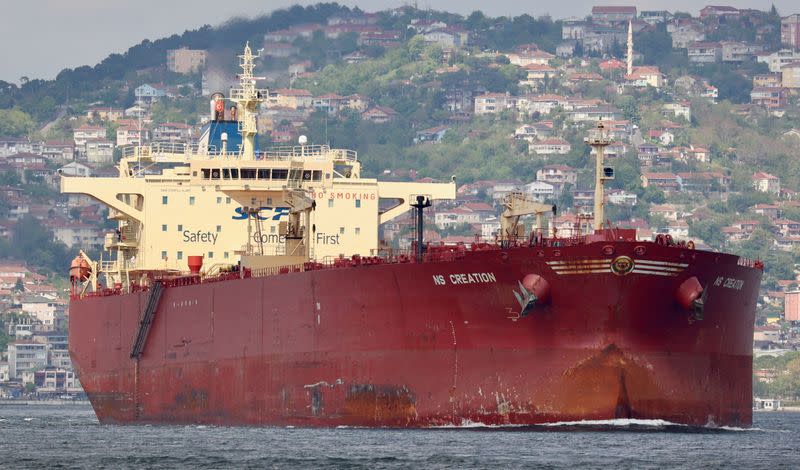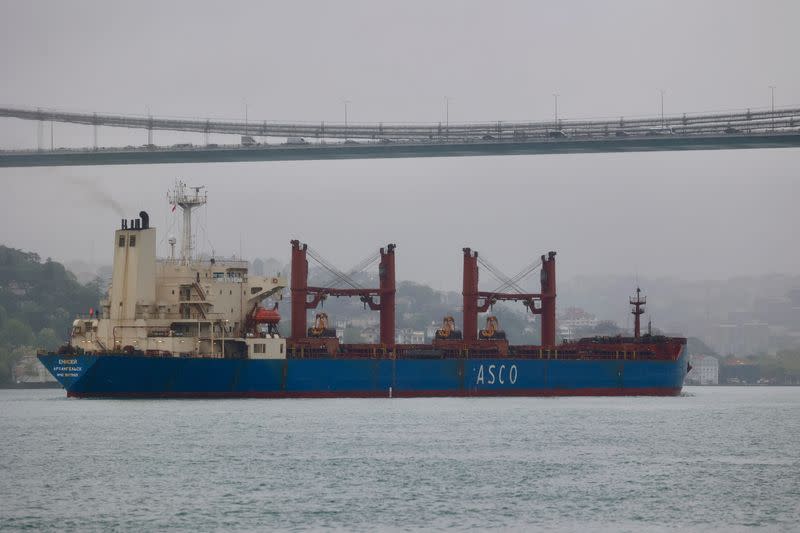EU to place sanctions on 19 tankers including LNG
By Julia Payne
BRUSSELS (Reuters) - The European Union will add 27 vessels, including oil and liquefied natural gas tankers, to its list of entities under sanctions as part of its latest measures against Russia, two sources familiar with the matter said on Monday.
EU countries adopted the 14th package of sanctions against Russia earlier on Monday. These included a ban on trans-shipments of Russian LNG off EU ports that will take effect after 9-month transition period. The full details will be published later in the EU's Official Journal.
The latest list, seen by Reuters, includes 19 tankers, including two Russian floating gas storage units (FSU) - the Saam and Koryak - as well as ships run by Russia's state-owned shipping firm Sovcomflot.
Owned by Russia's top LNG exporter Novatek, the two ships - already under US sanctions - were meant for trans-shipping LNG from its new Arctic LNG 2 project. Russia has a shortage of ice-class LNG ships and relies on trans-shipments to keep those it has in the Baltic Sea area.
The list also includes ships that have transported defence equipment for Russia as well as the Enisey cargo ship, which the EU says has moved stolen Ukrainian grains.
Moscow has been more adept than western powers expected at circumventing sanctions, including the Group of Seven (G7) nations price cap on Russian oil.
Russian oil exporters are charging more for their oil in major market India than at any time since the war in Ukraine started as a growing number of shippers and intermediaries take part in the trade.
The impact of the listing may not be immediate given the vessels already operate around western restrictions.
However, it is likely to complicate Russia's ambitions to gain a fifth of the global LNG market share by 2030-2035 from around 8% now.
“If you’re looking for spare parts, engineers, insurance, financing, in some cases local pilots - anything that involves some contact with the EU in the broadest sense, including countries mirroring EU sanctions - this all will become more difficult. For instance, navigation, safety and security equipment,” Nicoleta Tuominen, a partner at Dentons law firm, told Reuters.
“If an EU company developed such a system, others could fix it, but not to the same standard. The EU does not have the extra-territorial reach of US sanctions nor their leverage over certain flag states. Tankers are put on the sanctions list because ownership in that sector is elusive and at least this way, you might see some impact at some point.”
The following is a list of vessels to be added to the EU's official journal:
VESSEL TYPE NAME, IMO NUMBER
OIL Kemerovo 9312884
Beks Aqua 9277735
Robon 9144782
Galian 2, 9331153
Ocean AMZ 9394935
Vela Rain 9331141
Hebe 9259185
Andromeda Star 9402471
Canis Power 9289520
Hana 9353113
Krasnoyarsk (NS Creation) 9312896
Kaliningrad (NS Captain) 9341067
Krymsk 9270529
SCF Amur 9333436
NS Spirit 9318553
NS Lotus 9339337
NS Stream 9318541
LNG-related Saam FSU 9915090
Koryak FSU 9915105
Audax 9763837
Pugnax 9763849
Hunter Star 9830769
Grains Enisey 9079169
Defence M/V Angara 9179842
M/V Maria 8517839
Lady R, 9161003
Maia-1, 9358010
(Reporting by Julia Payne, additional reporting by Nerijus Adomaitis in Oslo and Paul Carsten in London; Editing by Gareth Jones and Barbara Lewis)

 Yahoo Finance
Yahoo Finance 


